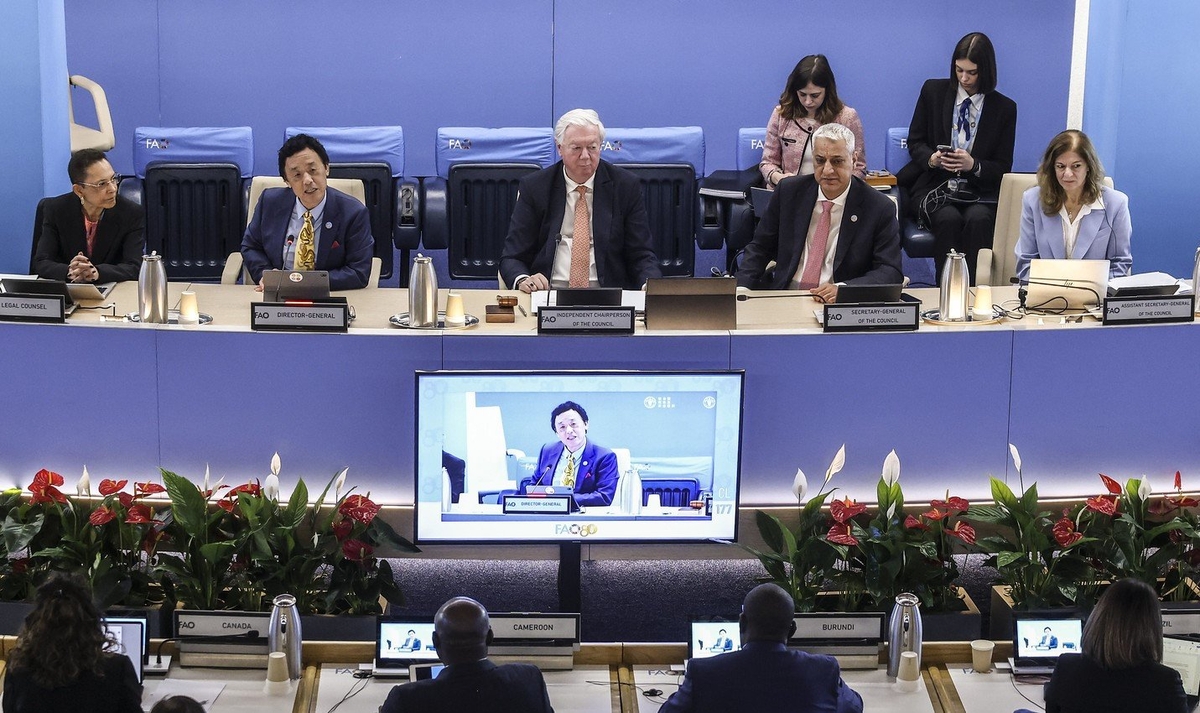June 3, 2025 | 06:18 GMT +7
June 3, 2025 | 06:18 GMT +7
Hotline: 0913.378.918
June 3, 2025 | 06:18 GMT +7
Hotline: 0913.378.918

FAO Director-General QU Dongyu addressses opening of 177th FAO Council.
The Director-General of the Food and Agriculture Organization of the United Nations (FAO), QU Dongyu, today urged FAO Members to turn global challenges into opportunities to accelerate the transformation of global agrifood systems as he opened the 177th FAO Council, which is the last Council session before the Organization’s proposed Programme of Work and Budget (PWB) for 2026-27 is submitted for approval to the FAO Ministerial Conference at the end of June.
“We are all in this boat together,” the Director-General said, invoking the collective will, effort, dedication and passion of all Members to make agrifood systems more efficient, more inclusive, more resilient and more sustainable to achieve the Four Betters – better production, better nutrition, a better environment and a better life, leaving no one behind.
The FAO Council is the executive organ of the FAO Conference, and its sessions can be followed by webcast. The Director-General’s opening statement can be accessed here.
Qu thanked all FAO staff and especially senior management for what he described as their day-and-night efforts to handle the evolving situation following recent decisions by the Government of the United States of America, which he noted had required rapid management of 106 terminated projects with a total value of $384 million and affecting about 1,240 personnel connected to US funded projects - 358 terminated to date with further staffing reviews underway.
FAO has a diversified resource mobilization strategy, and it began strengthening its preparedness and anticipation plans before the U.S. decisions in order to adapt to rapid changes in the global development funding landscape, Qu said. “As foreseen, our overall voluntary contributions for the first three months of this year are noticeably below the previous three record-setting years,” the Director-General added.
Participants in the Council and the Conference in June “need to ensure that the budget level they approve will enable the Organization to meet the increasing needs for our professional and technical support to Members,” he added.
Given natural and man-made disasters, as well as economic downturns, agrifood systems are destined to become more important in the future, Qu said. “The world is rapidly changing, and FAO has been and will be more essentially important to global demands."
Emphasizing that FAO understands the need in uncertain times to do better, do more, be more cost effective and to deliver at country level, Hans Hoogeveen, Independent Chairperson of the Council, said: “We have to build bridges and find compromises in order to succeed. The more FAO does the less burden on individual countries.”
Highlights
The Director-General’s Council-opening speech highlighted several FAO actions, initiatives and achievements during the first trimester of 2025.
He highlighted FAO’s emergency agriculture interventions in hunger hotspots such as the Democratic Republic of Congo, Gaza, Ukraine and Sudan, noting that China and the European Union had each contributed $10 million to bolster seed distribution initiatives reaching 2.7 million people in Sudan.
He outlined FAO’s work to contribute to COP30 climate conference to be held in Brazil later this year, and noted that FAO has now launched 100 projects in the Green Climate Fund Readiness portfolio, which helps countries achieve technical capacities to access globally available funding.
He also outpointed that FAO’s active engagement with the upcoming UN Oceans Conference, where it will launch the 2025 Review of World Marine Fishery Resources, the most comprehensive and participatory evaluation ever conducted on the state of the world’s stocks, involving 670 experts from over 90 countries and 200 entities, covering around 2,600 fish stocks.
He pointed to FAO’s ambitious convening of parties and experts to conferences on themes of high global salience, citing for example the Global Forum for Animal Feed and Feed Regulators to be held in late September and early October to coincide with the celebration of FAO’s 80th Anniversary.
(FAO)

(VAN) VAAS and numerous Vietnamese enterprises have signed cooperation agreements with Japanese partners to promote agricultural technology and trade connectivity.
/2025/05/29/5625-12-214801_567.jpg)
(VAN) Provincial mergers in the Mekong Delta promise to streamline administration, expand inter-provincial raw material areas, and foster close linkages in agricultural value chains, benefiting both businesses and cooperatives.

(VAN) Merging Mekong Delta provinces contributes to the expansion of agricultural raw material areas, addressing previous constraints caused by provincial boundaries. Additionally, this expansion will reduce costs and strengthen linkages between businesses, cooperatives, and farmers.
/2025/05/29/1043-2-153730_145.jpg)
(VAN) The Government's policy to merge provincial-level administrative units opens up major opportunities for the Mekong Delta region to reshape its agricultural development strategy toward large-scale production, effective regional linkages, and sustainability.

(VAN) The mutual export of agrifood products between the European Union (EU) and the United Kingdom (UK) must occur again without certification, border controls or other red tape. This was agreed at the UK-EU summit.
/2025/05/22/5121-2-173645_677.jpg)
(VAN) NBSAP Tracker identifies strengths and areas for improvement in the National Biodiversity Strategy, based on each region’s priorities and capacities.

(VAN) The draft amendment to the Circular on rice export trading stipulates a periodic reporting regime for rice exporting enterprises.